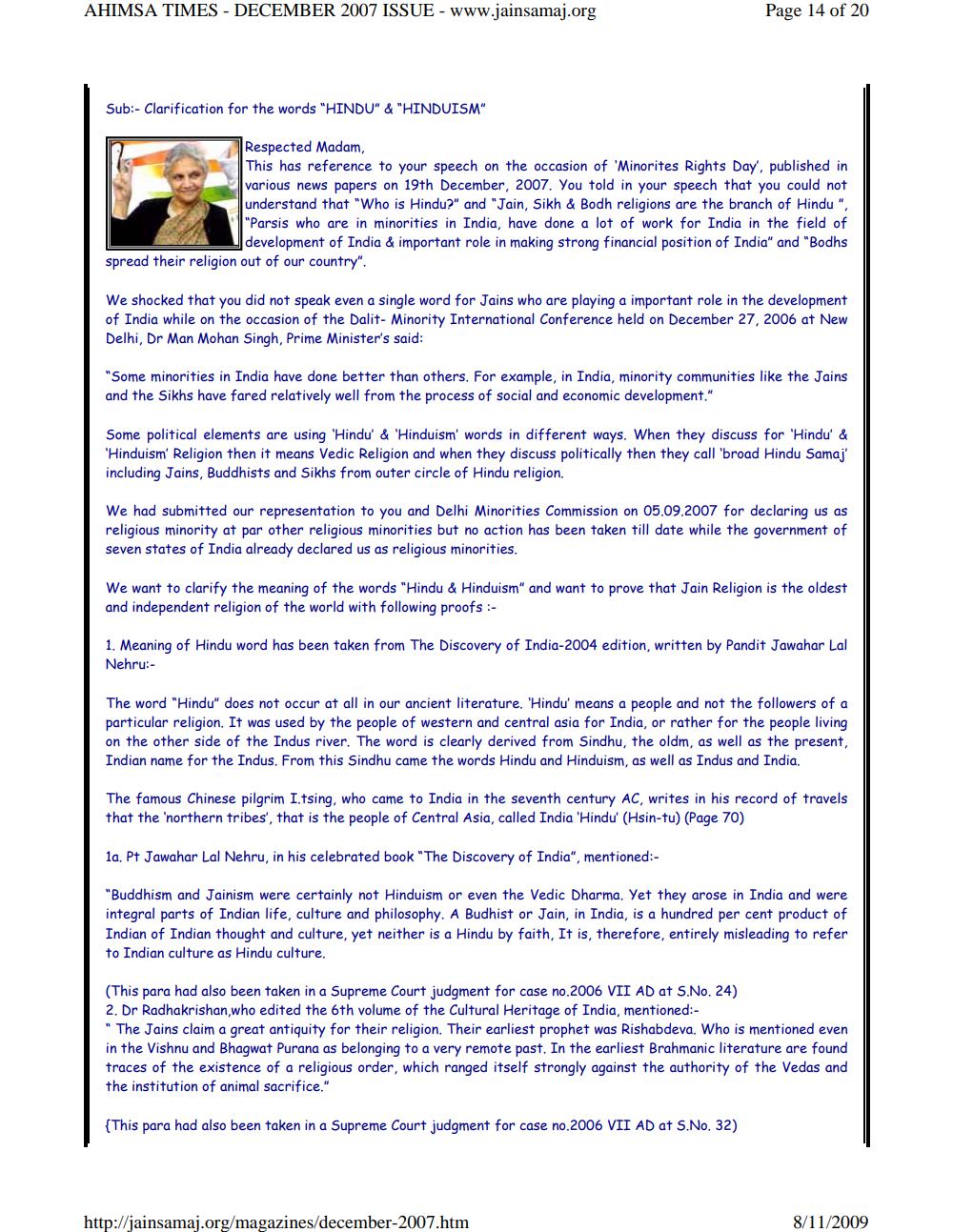________________
AHIMSA TIMES - DECEMBER 2007 ISSUE - www.jainsamaj.org
Page 14 of 20
Sub:- Clarification for the words "HINDU" & "HINDUISM"
Respected Madam, This has reference to your speech on the occasion of Minorites Rights Day'. published in various news papers on 19th December, 2007. You told in your speech that you could not understand that "Who is Hindu?" and "Jain, Sikh & Bodh religions are the branch of Hindu", "Parsis who are in minorities in India, have done a lot of work for India in the field of
development of India & important role in making strong financial position of India" and "Bodhs spread their religion out of our country".
We shocked that you did not speak even a single word for Jains who are playing a important role in the development of India while on the occasion of the Dalit- Minority International Conference held on December 27, 2006 at New Delhi, Dr Man Mohan Singh, Prime Minister's said:
"Some minorities in India have done better than others. For example, in India, minority communities like the Jains and the Sikhs have fared relatively well from the process of social and economic development."
Some political elements are using "Hindu' & 'Hinduism' words in different ways. When they discuss for 'Hindu' & "Hinduism Religion then it means Vedic Religion and when they discuss politically then they call 'broad Hindu Samaj including Jains, Buddhists and Sikhs from outer circle of Hindu religion.
We had submitted our representation to you and Delhi Minorities Commission on 05.09.2007 for declaring us as religious minority at par other religious minorities but no action has been taken till date while the government of seven states of India already declared us as religious minorities.
We want to clarify the meaning of the words "Hindu & Hinduism" and want to prove that Jain Religion is the oldest and independent religion of the world with following proofs :
1. Meaning of Hindu word has been taken from The Discovery of India-2004 edition, written by Pandit Jawahar Lal Nehru:
The word "Hindu" does not occur at all in our ancient literature. 'Hindu' means a people and not the followers of a particular religion. It was used by the people of western and central asia for India, or rather for the people living on the other side of the Indus river. The word is clearly derived from Sindhu, the oldm, as well as the present, Indian name for the Indus. From this Sindhu came the words Hindu and Hinduism, as well as Indus and India.
The famous Chinese pilgrim I.tsing, who came to India in the seventh century AC, writes in his record of travels that the 'northern tribes', that is the people of Central Asia, called India 'Hindu' (Hsin-tu) (Page 70)
1a, P+ Jawahar Lal Nehru, in his celebrated book "The Discovery of India", mentioned:
"Buddhism and Jainism were certainly not Hinduism or even the Vedic Dharma. Yet they arose in India and were integral parts of Indian life, culture and philosophy. A Budhist or Jain, in India, is a hundred per cent product of Indian of Indian thought and culture, yet neither is a Hindu by faith, It is, therefore, entirely misleading to refer to Indian culture as Hindu culture.
(This para had also been taken in a Supreme Court judgment for case no.2006 VII AD at S.No. 24) 2. Dr Radhakrishan who edited the 6th volume of the Cultural Heritage of India, mentioned:"The Jains claim a great antiquity for their religion. Their earliest prophet was Rishabdeva. Who is mentioned even in the Vishnu and Bhagwat Purana as belonging to a very remote past. In the earliest Brahmanic literature are found traces of the existence of a religious order, which ranged itself strongly against the authority of the Vedas and the institution of animal sacrifice."
{This para had also been taken in a Supreme Court judgment for case no 2006 VII AD at S.No. 32)
http://jainsamaj.org/magazines/december-2007.htm
8/11/2009




